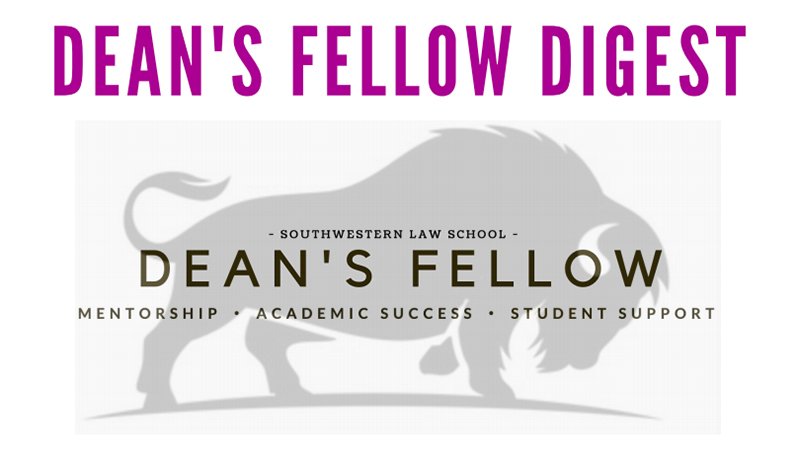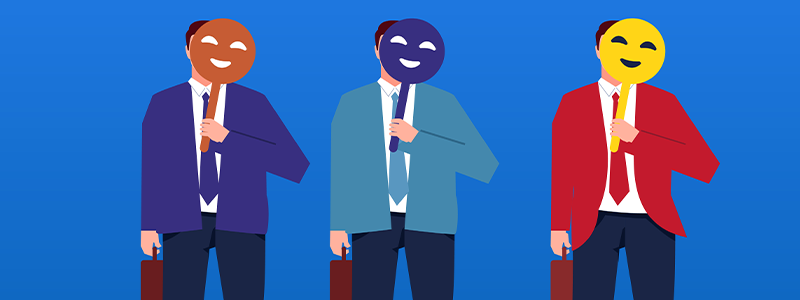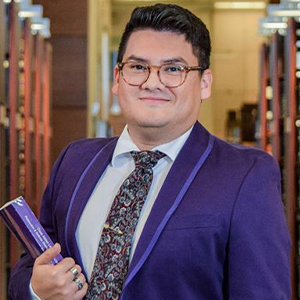SWLAW Blog | Dean's Fellow Digest

February 23, 2021
Dean's Fellow Digest Issue #25 - Imposter Syndrome
Issue: 2021-2-23
Dean's Fellows consistently strive to support students in realizing their full academic potential, leading ultimately to success on the bar exam and in the workplace. To support all Southwestern students in this goal, the Dean's Fellows created this Digest as a way to check-in at critical times throughout the semester with helpful tips, strategies, and encouragement.
IN THIS ISSUE:
- Imposter Syndrome
Imposter Syndrome
By: Abe Bran*

Disclaimer: I will be discussing some of my personal experiences in dealing with imposter syndrome. I do not intend to speak to how you should be feeling or how this should be manifesting for you. My sincerest hope is that this Digest opens the door to much-needed discourse within your lives and among our community. I believe we must normalize these conversations and provide community support in order to collectively and individually rise above.
Imposter syndrome is a powerful foe. Upon reflecting on my personal experiences in the matter, in researching the subject for this Digest, and in serving as a mentor and confidant to others, I have learned that imposter syndrome affects people in different ways and develops for different reasons.
For some, imposter syndrome arises from what we conventionally call “failures” – bad grades, missed opportunities, break-ups, etc. Under these circumstances, one might start to feel incapable of succeeding. This sense of defeat can manifest in varying degrees; from pessimistic thoughts and attitudes to quite literally giving up. Depending on the degree experienced, an individual might not feel empowered to pursue their goals with the same force as they once did. They might feel like they deserved to fail.
For others, imposter syndrome is born out of a feeling of inadequacy when they conventionally “succeed.” In these circumstances, a person can feel like they have tricked someone (or everyone), and they are not deserving of the grade, position, or responsibilities they have been given. When such is the case, they might feel like it’s only a matter of time before they are discovered for the fraud they believe themselves to be.
While the cause of the phenomenon might differ, the effect is very similar: strong feelings of self-doubt and inadequacy.
I must admit, the above breakdown of imposter syndrome and how it manifests is a huge oversimplification.
We are much more complex than just “winners” and “losers.”
We each have different aspects of our lives where we might feel like imposters and others where we might not. And among those, we might feel like imposters for different reasons.
Part of the reason imposter syndrome is so powerful, and at times crippling is because of how isolating it is. Many of us believe that we are the only ones who experience these feelings of inadequacy and fraud and that everyone else “has it together.”
This is only exacerbated when we consider the competitive nature of law school and the legal profession. Many of us feel like we cannot be transparent about our feelings without being labeled as weak and emotional. We, in turn, place the same expectations on others.
My purpose in writing this Digest is two-fold: (1) to remind you that imposter syndrome is something that many law students and lawyers struggle with at some point in law school and professional careers, and (2) to encourage you to seek spaces to have these conversations with people you trust.
Many of you see me as a great student and SBA President who has it all figured out. I can tell you that I frequently feel like this is far from the truth. Sometimes, I feel like I just got lucky and that people are taking a chance on me. Other times, I feel like it’s just a matter of time before I disappoint you all.
What helps me during these strong feelings of self-doubt is my support system. My good friends inside and outside of law school who I can be honest with about these feelings. And who in turn, are honest with me. I encourage each of you to seek these opportunities and spaces to be vulnerable because they truly are liberating and cathartic.
In closing, while Dean’s Fellows are academic mentors, our role is broader than this. We are here to support and encourage you holistically. Please feel free to reach out to one of us (or to anyone you trust) to talk about your experiences with imposter syndrome. In doing so, you just might find out that you’re not that alone, either.
*About the Author:
ABE BRAN

Abraham (Abe) Bran is a Traditional Day 3L student. He is concentrating in civil litigation and advocacy and public interest law at Southwestern and is pursuing an MBA/JD dual degree with the Drucker School of Management. Abe is a judicial extern for the Honorable Stuart Rice at the Los Angeles Superior Court.
In addition to being a Dean’s Fellow, Abe is the Student Bar Association President, Co-President of the Latino Law Students Association, Co-President of the Environmental Law Society, and the Special Projects Editor for the Law Review. He is also a Teaching Assistant in Constitutional Law, Constitutional Criminal Procedure, Torts, and is a former Contracts and Environmental Law Teaching Assistant. He is also an advanced clinical student in the Community Lawyering Clinic.
Southwestern Law School Dean's Fellows | Scheduling and Booking Website
Dean’s Fellows are upper-division students with strong academic skills who go through a rigorous application and training process. They are an integral part of the Academic Success and Bar Preparation Department. They are carefully selected based on their academic excellence and ability to teach other students best-practice study methods that will help them become acclimated to the study of law. Dean’s Fellows meet with students as academic mentors.
Please click HERE to make an appointment with a Dean's Fellow.